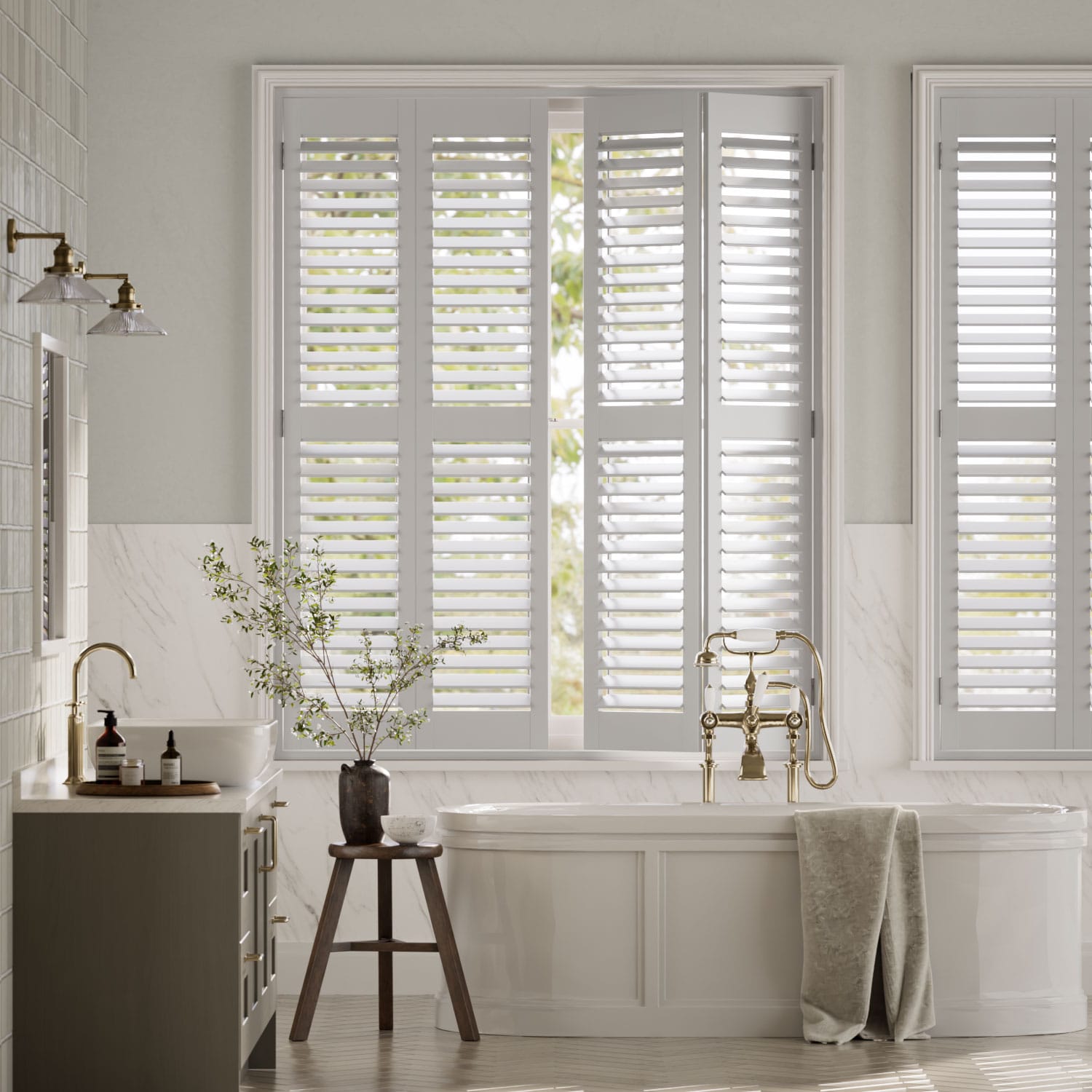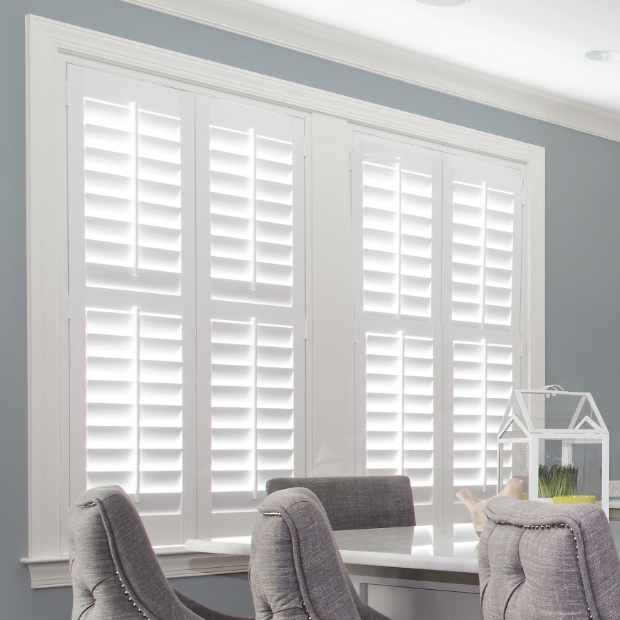Motorized Blinds Phoenix: Clever and Beneficial Window Coverings
Motorized Blinds Phoenix: Clever and Beneficial Window Coverings
Blog Article
Recognizing the Differences Between Blinds and Shutters for Your Home Window Therapy Requirements: A Comprehensive Overview to Help You Select the very best Option
When considering window treatments, comprehending the differences in between shutters and blinds is vital for making an enlightened selection that lines up with your aesthetic and useful demands. Blinds provide adaptability and price, while shutters radiate ageless sophistication and offer improved insulation. As you evaluate these options, it's vital to think about not simply the prompt appeal, yet likewise the long-lasting advantages and downsides of each. To browse this decision effectively, a number of essential elements should be analyzed, triggering a better assessment of just how each alternative can distinctly offer your setting.
Introduction of Blinds
When taking into consideration home window treatments, blinds are commonly a popular choice as a result of their adaptability and capability. They are readily available in different materials, including wood, fake wood, light weight aluminum, and plastic, permitting property owners to pick options that match their interior decoration while fulfilling functional needs. Blinds are created to manage light and privacy efficiently; their slatted framework can be gotten used to permit varying levels of sunlight, making them ideal for different rooms and tasks.
Additionally, blinds come in a variety of designs, such as vertical, horizontal, and mini blinds, supplying property owners with enough options to fit their certain home window shapes and sizes. Their simplicity of setup and maintenance better enhances their allure; most blinds can be cleansed with an easy dusting or clean down, guaranteeing they continue to be attractive with time.
Furthermore, modern-day innovations have caused the introduction of mechanized blinds, offering benefit and the ability to regulate them from another location. This technical advancement caters specifically well to those looking for improved capability. On the whole, blinds function as a useful and stylish home window treatment alternative for a wide variety of household and business applications.

Overview of Shutters
Shutters are a highly concerned window therapy choice that combines aesthetic appeal with exceptional capability - window shades phoenix. Readily available in different styles, consisting of hacienda, typical, and café, shutters can improve the character of any kind of area while giving reliable light control and privacy. Built from materials such as wood, composite, or plastic, they are designed to stand up to deterioration, making them a resilient choice for house owners
Among the key benefits of shutters is their versatility. They can be custom-fitted to virtually any window form and size, permitting a customized appearance that enhances your home's style. In addition, shutters use superb insulation residential properties, assisting to regulate interior temperature levels and possibly decreasing power expenses.
Shutters are likewise easy to preserve, requiring just periodic cleaning and cleansing to maintain them looking beautiful. Their durable style implies they are much less likely to be damaged contrasted to other window treatment choices. Moreover, shutters can enhance home worth, as they are often checked out as a premium attribute by prospective purchasers. In recap, shutters give these details an ageless solution that balances beauty, functionality, and lasting financial investment capacity for any type of window treatment demands.
Key Distinctions

An additional trick distinction is the method of operation. Blinds run through a system of cords or wands that turn or raise the slats, enabling users to change light levels easily. Shutters, nonetheless, attribute hinged panels that can be opened up or closed totally or gotten used to manage light and privacy.
Cosmetically, blinds frequently offer a modern, streamlined appearance, while shutters lend a classic, classic charm to insides. Furthermore, shutters can improve insulation due to their solid construction, which blinds might not give.
Pros and Disadvantages
Blinds are frequently favored for their flexibility and price. In addition, blinds are relatively easy to set up and can be changed to manage light and personal privacy efficiently.
On the other hand, shutters are renowned for their toughness and visual charm. Shutters generally call for much less upkeep and can give an included layer of safety and security.
Selecting the Right Choice
Choosing the proper window therapy for your home involves cautious factor to consider of numerous elements, including capability, aesthetic appeals, and budget. Blinds and shutters each offer unique advantages and downsides that can affect your choice.
Capability is vital; take into consideration exactly how much light control and personal privacy you want. Blinds normally enable more convenience in readjusting light levels, while shutters supply robust insulation and soundproofing residential or commercial properties. Shutters may be the far better choice due to their solid construction. if energy efficiency is a priority.
Aesthetics additionally play a crucial function. Blinds come in various products and styles, making them appropriate for why not try these out contemporary insides. On the other hand, shutters radiate a traditional elegance, improving the general architectural allure of your home.
Budget restrictions are just as crucial. Blinds typically use a more affordable preliminary investment, whereas shutters can be pricier yet might give long-lasting value via longevity and power cost savings.
Ultimately, the right alternative relies on your details demands and choices - blinds phoenix. By assessing Your Domain Name these aspects very carefully, you can choose a home window treatment that balances with your lifestyle, improves your space, and fits within your economic criteria
Conclusion
To conclude, selecting between blinds and shutters needs mindful consideration of different factors, consisting of functionality, aesthetic preferences, and budget restrictions. Blinds use versatility and cost, making them ideal for modern-day designs, while shutters provide a classic style and boosted insulation, albeit at a greater cost and installation complexity. Inevitably, the choice depends upon private needs and the desired setting of the home, ensuring that the chosen window treatment straightens with both stylistic and useful needs.
When taking into consideration window treatments, comprehending the differences in between shutters and blinds is necessary for making an enlightened selection that straightens with your aesthetic and practical demands. Blinds offer versatility and affordability, while shutters exude classic sophistication and supply boosted insulation.Various factors differentiate blinds and shutters as home window treatment options, each providing to different functional needs and visual choices. Furthermore, shutters can improve insulation due to their solid building and construction, which blinds may not supply. Blinds supply versatility and affordability, making them appropriate for modern designs, while shutters offer an ageless sophistication and boosted insulation, albeit at a higher expense and installation complexity.
Report this page